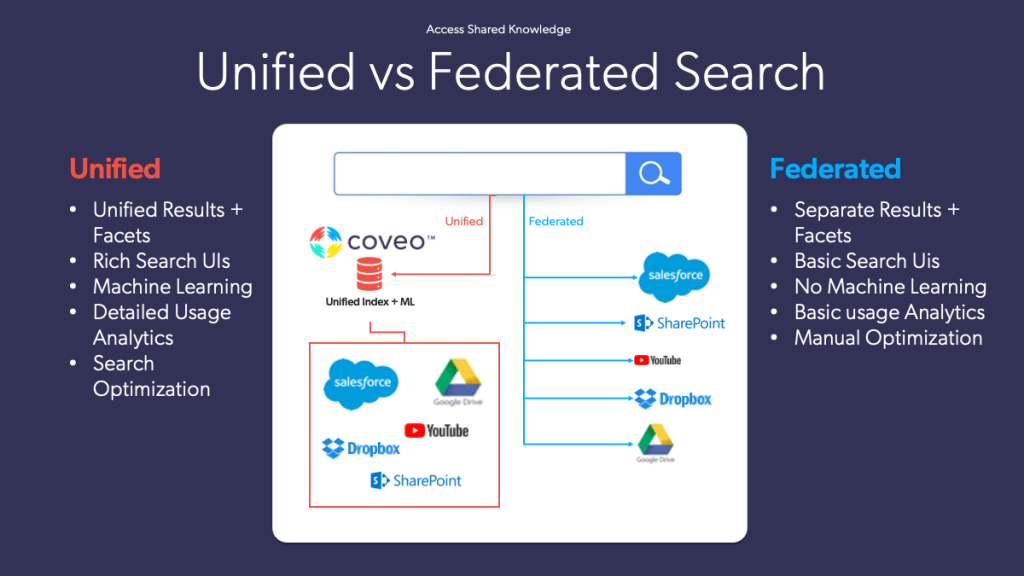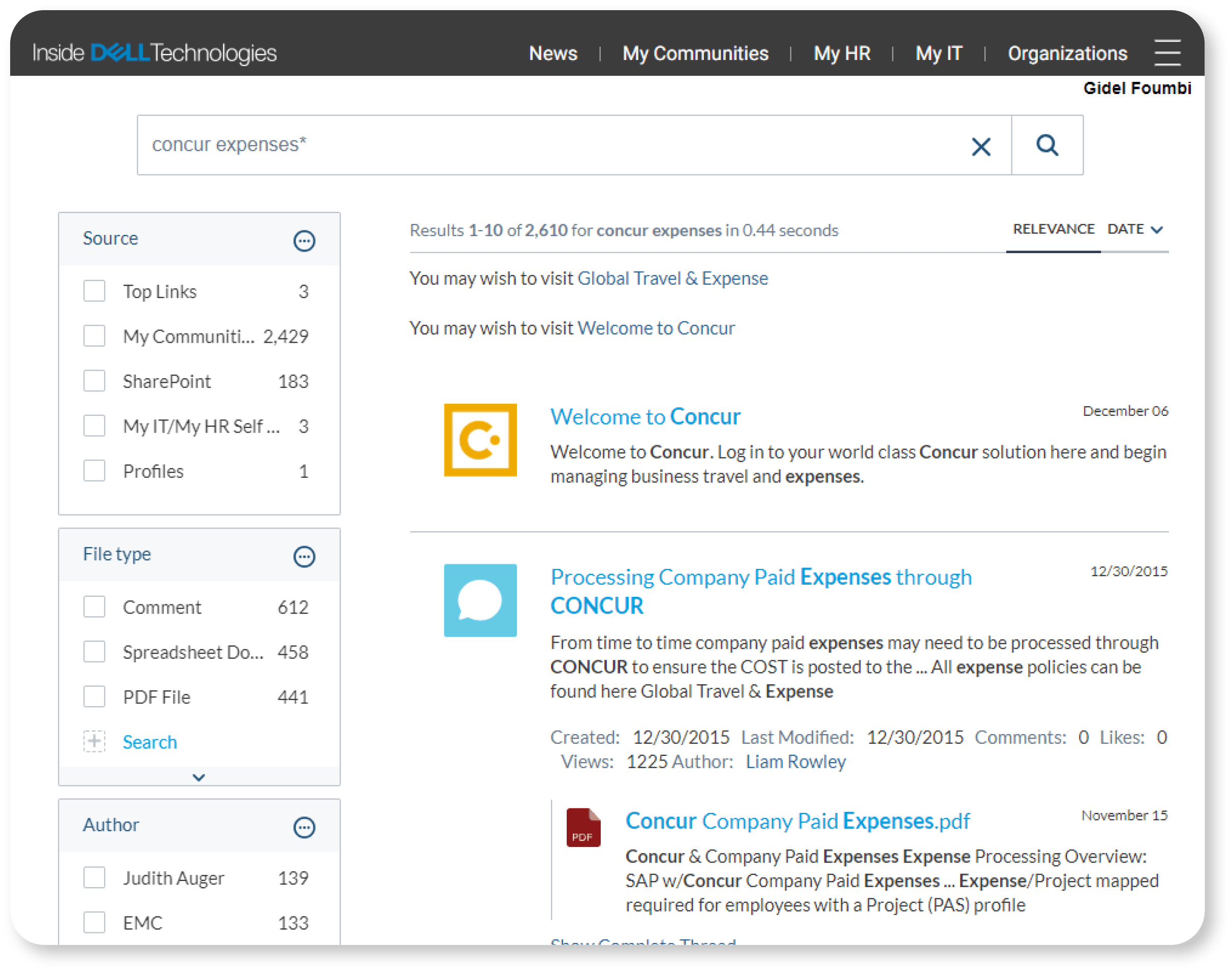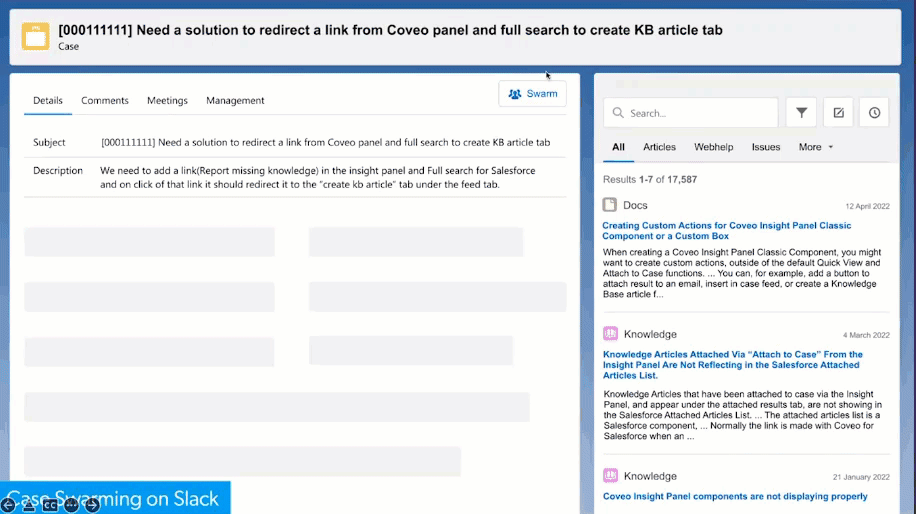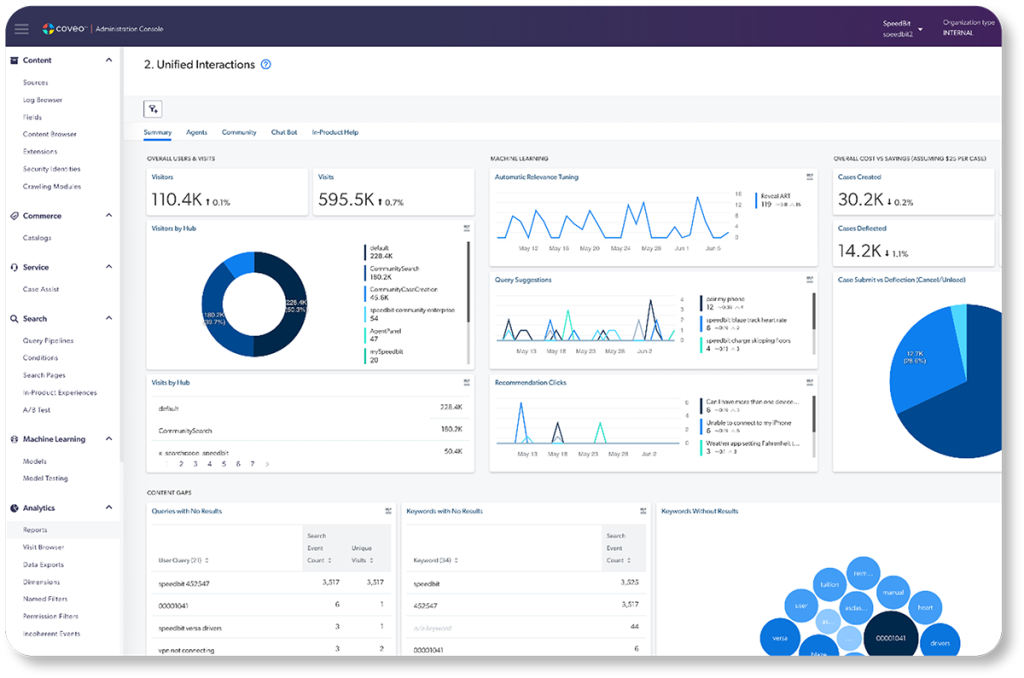When employees feel engaged in their work, they thrive. As do the enterprises they work for: highly engaged business units and teams experience 78% less absenteeism and enjoy a 10% increase in customer loyalty, according to Gallup. Our own research has already revealed the role that workplace AI can play in realizing these outcomes.
In this article, we’ll focus on a crucial component of effective workplace AI: AI search.
The benefits of AI enterprise and neural search include personalized responses based on user’s preferences, behavior and historical interaction. It can understand and comprehend natural language queries, making employee search experiences more intuitive and user friendly.
But how does this translate to better workplace management? Where does AI search fit into your integrated workplace management system?
What use cases should you consider?
Why AI Search Is Essential for Modern Workplace Management
Think of workplace AI as a unified resource for your employees. When workers need help on the job, or go looking for timely answers, AI is there to help, always working in the background to anticipate what’s needed next.
Today’s employees could use the help. Our research into major workplace trends found that 47% of employees said that they’re slowed down by information stored across multiple applications. They spend up to three hours on an average workday searching for information.
These are inefficiencies that AI search can solve.

AI search relies on machine learning techniques like natural language processing (NLP) to capture semantic understanding. This allows it to enhance and personalize employee search experiences. It’s the same technology that guides online shoppers along tailored journeys, and it can help employees do the same in their day-to-day work.
AI search integrates with digital workplace solutions in a number of different ways. For example:
- Unified Search Experience: Gives employees one intelligent search experience that they can use to find information across multiple systems.
- Personalized Recommendations: Recommend answers, next steps, and resources based on comprehensive (and unified) employee data.
- Task Automation: Identify and automate repetitive tasks, such as booking conference rooms, summarizing calls/meetings, and feeding data into CRM, ERP, and HRM solutions.
The predictive and personalized nature of AI search is a far cry from traditional search functionalities. In the past, employees could only get so much out of search experiences that relied on exact-phrase keyword matching, siloed data sources, and incomplete information.
Now, the intelligent capabilities of AI search make it a go-to source of timely, highly relevant information. In the modern workplace, with its increasing reliance on digital tools and hybrid/remote settings, AI has the power to augment worker abilities in ways that few other technologies can.
Let’s take a closer look at specific use cases.
Empowering Employee Self-Service and Collaboration
One of the most effective ways to streamline workforce management is to empower the workforce itself. Give employees the ability to search the knowledge base for benefits management FAQ, instead of tying up HR. Let them onboard, upskill, and cross-skill on demand, on their own time, instead of requiring expensive in-house or third-party training and development programs.
The list of potential use cases for employee self-service goes on.
Examples of Employee Self-Service
- IT Knowledge Base: Ease the pressure on busy IT teams with a searchable repository of how-to’s, FAQs, troubleshooting recommendations, and suggested solutions.
- HR Portal: Reduce HR-related queries by allowing employees to self-manage everything from personal information and payroll, to benefits, time/attendance, and performance management.
- New-Hire Onboarding: Provide new employees all they need to complete required documentation, training modules, and other onboarding procedures.
These and other forms of employee self-service can reduce the amount of time workers spend searching for information. It can help them reach proficiency faster and solve problems on the fly. Here’s how AI search deepens and enhances these benefits:
Faster Response Time with Unified Search
Unified search is a fundamental building block of workplace AI. It creates a single unified index of access to content storage systems across the enterprise, and self-optimizes the experience with machine learning. As a result, employees can quickly find answers and recommendations in whatever digital workplace solutions they’re using.

As for what this looks like in practice, you can imagine an internal IT help desk team fielding support requests from employees all day. What if they had an intelligent search function embedded directly in their view, there to help them find answers, resources, and information in just seconds?
They’d handle tickets with greater efficiency, be more productive, and extend the same benefits to the colleagues they serve.
Intelligent Content Discovery
There’s a difference between expecting employees to go seek information and bringing that information to them proactively. AI search supports intelligent content discovery, in which answers and recommendations arrive to the employee in the moment of need, instead of the other way around.
The Coveo platform employs a powerful recommendation engine to deliver this degree of employee self-service. The engine uses employee data and insights to surface relevant content in the channels, applications, and interfaces that employees are already using — often before they even need to search.
Thinking back to the internal IT help desk example, think of how many fewer tickets would come through if AI was there to serve up relevant solutions to employees, right up to the moment they submit the actual case?

Deeper Personalization
One of your strongest advantages in optimizing workplace management is access to data. In most cases, your organization already has extensive amounts of customer and employee data stored across multiple systems. Workplace AI can use all of this data to learn what each individual needs, on a near moment-to-moment basis.
Take the sales team, for instance. When recommending content to a Sales Development Representative (SDR), AI search can account for:
- Business unit, role, and responsibilities
- Profile, preferences, and past behavior
- Past data from similar interactions (e.g., call recordings)
- Relevant knowledge from other repositories and workplace applications
As a result, that SDR can find that script, sales play, or product detail they’re looking for a lot faster, helping them to create more revenue opportunities for the organization.
Enhanced Collaboration
A customer service representative might sit alone at their desk, but they’re routinely reaching out to other reps for help. Someone who has dealt with a particular issue before, for example; or someone with specific domain expertise.
This type of collaboration is especially critical in hybrid or fully remote-work environments, in which collaboration tools might be the only lifeline an employee has to the shared knowledge of their colleagues.
Workplace AI is built to enhance this type of collaboration.
In support of intelligent case swarming for an organization using Salesforce, for example, Coveo relies on a Case Classification machine learning model. The model uses information in the specific case to identify the names of employees that have handled a similar case—from across your entire Service Cloud database. Once the agent confirms that these are the right people to include, the system initiates a dedicated Slack channel in which the agents can collaborate on the case.

Coveo can also index Slack conversations, ensuring that information remains available even into the future.
The AI-Powered Intranet Portal
The market for employee engagement software is expected to grow 16% in CAGR by 2033. Given the benefits of an intranet portal for workplace management, we can expect this particular software subset to be a core focus of these investments.
An intranet portal often serves as a centralized hub for internal communication, company updates, and document sharing. It also serves as the home of employee forums and recognition, two useful means for fostering a sense of community and engagement.
Designed well, an intranet portal ought to facilitate the seamless information flow across the organization — assuming it’s searchable.
Search is the first thing that most employees want to do when they need answers. When you power that search experience with AI, you can significantly enhance the portal’s role in workplace management:
- Unify intranet sources (documents, knowledge base articles, etc)
- Quickly surface relevant information and resources
- Personalize the portal experience for each employee
- Tailor search results and content recommendations
In addition, Coveo’s intranet solution has been proven to cut costs on portal maintenance. This is thanks to continuous machine learning that can deliver the most relevant experience to employees without the need for costly knowledge base maintenance.
How do you build an AI-powered employee intranet?
First, choose an enterprise search solution capable of indexing everything: documents; help articles; internal resources; even internal communications (email, Slack, etc.). This unified index, combined with machine learning capabilities, enables AI to transform the intranet into a centerpiece of the employee experience, one that can:
- Surface enterprise-wide knowledge instantly
- Predict what each employee needs next
- Curate relevant featured content
- Integrate with existing workplace management solutions
- Protect access to sensitive information
Advanced Analytics & Reporting
Business leaders who oversee workplace management, operational efficiency, and employee performance need a reliable view of what’s actually going on. Especially as teams continue to navigate a hybrid workplace with distributed teams, it’s crucial that employees can access the information they need to do their jobs.
You’ll find that AI-search analytics can greatly enhance the collection and analysis of important workplace data needed for decision making, including:
- HR and IT articles that users successfully accessed to self-service a documented issue
- Gaps in knowledge identified through searches that did not surface relevant content
- Topics that employees don’t fully grasp, as indicated by search queries
- Process issues raised through both keywords and popularity (i.e., how often they’re searched)
- Whether employees are connecting with the right subject matter experts, to ensure timely delivery of outputs and other workplace projects
Within each of these use cases, workplace AI is actively aggregating data, applying contextual understanding, and delivering real-time analytics. You can lean on it as a reliable source of highly accurate insights as a result.
This is one of the ways that Ellucian uses Coveo’s customizable reports. Because Coveo integrates with Tableau — the Ellucian team’s analytics solution of choice — employees can spin up customized reports in a few clicks.
Here’s what that experience looks like in practice:

Search Analytics
The Coveo Platform utilizes search analytics to turn workplace AI into an insight engine. It continuously learns from queries, questions, and clicks, connecting the dots to show their impact on your corporate KPIs.
What are your employees routinely searching for and not finding?
What are the internal help desk issues consuming the most time, effort, and budget?
Search analytics can find the answers, leading to considerable results across nearly all major use cases:
- Service and support: 80% increase in average case deflection
- Ecommerce: 10% increase in average order value
- Workplace: 30% decrease in average content gap score
- Websites: 55% increase in search and visit success rate
Integration with Other Business Tools
An integrated workplace management system lays the groundwork for the cohesive work environments and proactive decision-making processes you depend on to streamline operations. The ability to integrate with other systems is one of the cornerstone advantages of workplace AI:
It enables the seamless flow of data between all of the platforms you use, from HR systems to project management software. Thus, users experience a much more consistent, omnichannel digital journey as a result.
It ensures data consistency and accuracy by eliminating data silos, meaning you always get reliable recommendations, personalizations, and insights.
It allows for better workflow automation across the workplace management solutions you already use. Think: routine data entry, reporting, and scheduling. Ticket routing and 24/7 self-service. Energy management and space utilization.
What Types of Integrations Should You Prioritize?
Start with the workplace management solutions that you rely on to drive operational efficiency, data accuracy, and employee productivity. Where could the integration of workplace AI search deepen the value of these solutions?
Top Examples of Workplace AI Integrations
- Enterprise Resource Planning (ERP)
- Customer Relationship Management (CRM)
- Human Resource Management Systems (HRMS)
- Project Management Tools
- Communication and Collaboration
- Financial Management and Accounting
- Data Analytics and Business Intelligence
- Customer Support and Helpdesk Software
- Security and Compliance Tools
- Workflow Automation Platforms
We’ve already mentioned how Coveo AI search integrates with digital workplace solutions like Slack. But the full list of integrations — including Salesforce Sales Cloud, Dropbox, and ServiceNow — underscores the importance of integration capabilities. Namely:
Improve the employee self-service experience without asking employees to adopt any new tools, knowledge management systems, or processes.
Choosing the Right Enterprise Search Solution for Your Business
It’s easy to characterize workplace AI as the future of workplace management. But let’s not overlook the people that workplace AI is built to serve. Today, many employees still distrust AI. At the same time, the evolving nature of their work — and their workplace environments — necessitate the need for effective workplace AI solutions.
If not already, then sometime very soon.
Which is why we always recommend a measured approach to this technology. Instead of framing workplace AI as a replacement for human work, think of it as an augmentation. An intelligent copilot.
Within this framework, you’ll find ample use cases for tools like AI search that enhance employee engagement while supporting long-term organizational success.
We covered a number of use cases in this blog post. In summary:
- Intelligent, personalized, and timely employee self-service
- AI-powered intranet portals that create value for all employees
- Comprehensive analytics and reporting for better decision making
- A connected, cohesive, and integrated workplace management system
As you consider AI search for your own digital workplace, start with your specific workplace needs. And start small. Where could incremental improvements in productivity, response time, or knowledge sharing lead to a more engaged workforce?
In most cases, AI search can deliver these results and then some.
Considering workplace AI for your business? Unlock the full potential of your workplace management system with Coveo’s AI search solutions.


